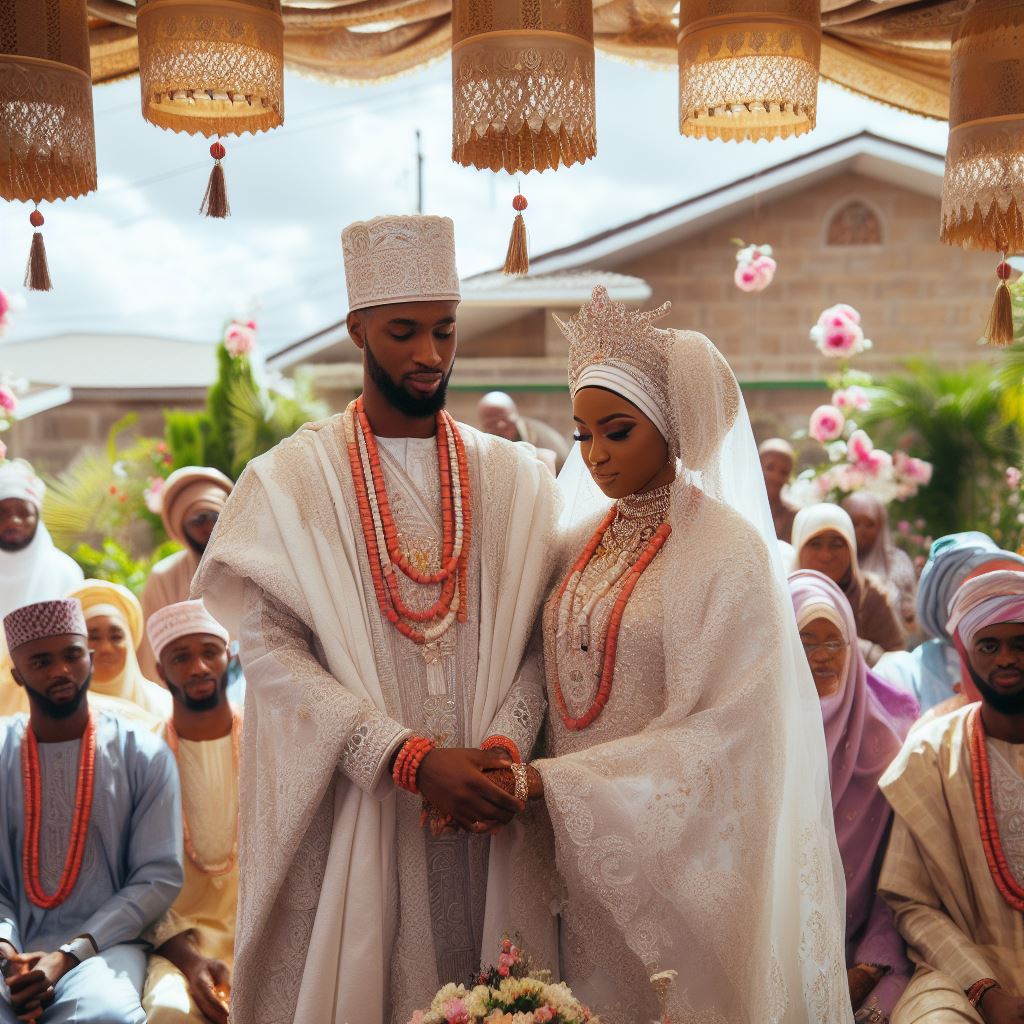Rights and Responsibilities: Husband-Wife Dynamics in Islam
Last Updated on October 15, 2023
Introduction
Husband-Wife Dynamics in Islam
The rights and responsibilities of husband and wife in Islam are of profound significance, shaping the core of a marital relationship.
The Quran and Hadith deeply root their teachings, guiding how a husband and wife should interact, support each other, and face life’s challenges.
The Crucial Role of Rights and Responsibilities
Central to this sacred bond are the rights and responsibilities assigned to both partners.
Islam places a strong emphasis on the equitable distribution of these rights and responsibilities to ensure a harmonious and loving relationship.
Respect each spouse’s specific rights while they must actively fulfill their respective obligations.
Key Concepts to Explore
In this blog post, we’ll delve into the key ideas that underpin these dynamics. These include:
- Mutual Respect: Understanding how respect is not only a virtue but also a right for both spouses, fostering an atmosphere of kindness and consideration.
- Support and Partnership: Exploring the role of support, both emotional and practical, and how working together as partners is integral to marital success.
- Harmony and Communication: Discussing the importance of effective communication in resolving conflicts and maintaining peace within the marriage.
- Shared Responsibilities: Highlighting the shared duties and responsibilities that create a balance and ensure the well-being of the family.
Understanding and implementing these principles is essential for a healthy and enduring marital relationship in Islam.
As we continue through this blog post, we will delve deeper into each of these concepts to gain a comprehensive understanding of husband-wife dynamics in Islam.
Rights of the Husband in Islam
In Islam, the husband is granted several rights within the marriage relationship.
These rights aim to create a harmonious, balanced dynamic between the husband and wife.
Rights of the Husband
- The right to be respected and obeyed by his wife.
- The right to be consulted and involved in decision-making concerning family matters.
- The right to have his physical and emotional needs fulfilled by his wife.
- The right to intimacy and sexual satisfaction within the boundaries of Islam.
- The right to have his wife prioritize his companionship and spend time with him.
- The right to live in a clean and organized home environment.
- The right to be loved, cared for, and supported by his wife.
- The right to enjoy the company of his children and play an active role in their upbringing.
- The right to be financially supported by his wife if he is unable to provide for the family temporarily.
In addition to these individual rights, Islam recognizes the husband as the leader and decision-maker in the family unit.
Leadership and Decision-Making Role
The concept of leadership in Islam emphasizes the husband’s responsibility to lead the family with wisdom, kindness, and fairness.
The husband should consult and seek input from his wife before making any decisions, retaining the final say in family matters.
This leadership role is not a means for dominance or control, but rather a call for husbands to fulfill their duties in a just and responsible manner.
It is essential for husbands to consider the well-being and happiness of their wives and children in every decision they make.
Husband’s Responsibility to Provide Financially
Islam places the responsibility of financial provision on the husband.
He must actively provide his wife and children with food, clothing, shelter, and education, meeting their essential needs.
This financial responsibility is a testament to the husband’s role as a provider and protector in the family.
He must use not only his earnings but also any wealth or property he owns for his family’s well-being.
Despite the husband’s primary responsibility, Islam recognizes that both spouses can contribute to the family finances if mutually agreed upon.
In such cases, the husband should not feel threatened or undermined, but rather appreciate the support and commitment of his wife.
Basically, the rights granted to the husband in Islam aim to establish a strong bond between partners, providing a framework for love, protection, and mutual respect within the marriage.
It is crucial for husbands to fulfill their responsibilities while recognizing the rights and contributions of their wives.
Read: Marriage Certificate in Nigeria: A Step-by-Step Guide
Responsibilities of the Husband in Islam
Husbands in Islam have significant duties that shape their roles within the marriage
- Financial Support: The husband is the primary provider for the family, ensuring their material needs.
- Protection: He must safeguard his wife’s physical and emotional well-being.
- Guidance: Providing spiritual guidance and support for the family’s religious growth is vital.
- Fair Treatment: Treating each wife fairly (if applicable) is crucial.
Kindness, love, and mercy towards the wife are paramount
- Love: The Quran encourages husbands to love their wives deeply and express it.
- Mercy: Showing compassion and understanding in all matters is essential.
- Respect: Respecting her opinions, choices, and feelings strengthens the bond.
- Companionship: Being a true companion and friend enhances marital bliss.
The husband’s role in maintaining harmony and resolving conflicts is pivotal
- Communication: Open, respectful communication resolves issues effectively.
- Patience: Demonstrating patience during disputes fosters resolution.
- Mediation: Husbands can mediate conflicts wisely and fairly.
- Seeking Allah’s Guidance: Turning to Allah for guidance in challenging times is a practice.
In Islam, husbands bear these responsibilities not as a burden but as a means to create a loving, harmonious, and enduring partnership with their wives.
Understanding and fulfilling these duties with kindness and compassion is essential for a successful marriage.
Read: Islamic Marital Duties: A Guide for Nigerian Couples
Rights of the Wife in Islam
Rights Granted to the Wife
- Islam cherishes the wife’s right to financial security, with the husband responsible for her sustenance.
- The wife possesses the right to dignity and respect, a fundamental cornerstone in Islamic marriages.
- Rights grant emotional support and companionship, fostering a nurturing, loving atmosphere.
Respect, Protection, and Provision
- Respect transcends all aspects of marriage. It includes listening, valuing her opinions, and acknowledging her needs.
- Protection isn’t just physical; it extends to safeguarding her emotional and psychological well-being.
- Provision maintains her financial stability and ensures her comfort and well-being remain uncompromised.
Consent and Fair Treatment
- The wife’s consent is paramount in Islam. She should willingly enter into the marriage contract.
- Fair treatment is a core principle. The husband is obliged to treat his wife equitably, justly, and kindly.
- Islam advocates resolving disputes amicably, with consideration for her feelings, to maintain a harmonious marital bond.
Generally, Islam recognizes and respects the rights of the wife in a marriage, emphasizing dignity, emotional support, and financial stability.
The concepts of respect, protection, and provision are pivotal in maintaining a healthy relationship.
Consent and fair treatment are cornerstones, fostering love and harmony between spouses.
Read: Igbankwu: The Beauty of Igbo Traditional Marriages

Responsibilities of the Wife in Islam
Responsibilities that Islam places on wives
Wives in Islam are entrusted with several crucial responsibilities.
- Obedience: It’s imperative for wives to obey their husbands within the boundaries of Islamic principles.
- Loyalty: Loyalty to the husband and the marriage is highly valued.
- Support: Offering emotional and moral support to the husband is essential.
Importance of obedience, loyalty, and support towards the husband
- The Quran’s teachings promote husbands and wives obeying each other for a harmonious family life.
- This obedience, however, does not entail blind subservience but rather respect for the husband’s authority.
- Loyalty is a cornerstone, fostering trust and stability within the marital relationship.
- It involves fidelity, honesty, and a commitment to work through challenges together.
- Support is a two-way street; husbands and wives are expected to support each other.
- A supportive wife helps alleviate her husband’s burdens, emotionally and practically.
The wife’s role in managing the household and raising children.
Essentially, Islam places significant responsibilities on wives encompassing obedience, loyalty, and support for their husbands.
Additionally, wives play a pivotal role in managing the household and raising children, contributing to the strength and stability of the family unit.
Read: Arranged vs. Love: Navigating Marriage Choices in Nigeria
Mutual Rights and Responsibilities in Islam
In Islam, the husband-wife relationship is built upon a foundation of mutual respect, love, and care.
This section will explore the concept of mutual rights and responsibilities in Islamic marriage, highlighting the importance of communication, consultation, and decision-making.
Mutual Respect, Love, and Care
- In Islam, both husband and wife are urged to treat each other with utmost respect.
- Love and compassion are essential components of a successful marital relationship in Islam.
- Both partners have the responsibility to take care of each other’s physical, emotional, and spiritual needs.
- By creating a nurturing and loving environment, couples can strengthen their bond and create a harmonious family.
Importance of Communication and Consultation
- Effective communication is crucial in Islamic marriage for understanding each other’s thoughts, feelings, and concerns.
- Consultation plays a vital role in resolving disputes and making important decisions together.
- Open and honest communication helps prevent misunderstandings and promotes harmony in the relationship.
- By actively listening and valuing each other’s opinions, couples can build trust and strengthen their connection.
Principle of Mutual Decision-Making and Shared Responsibilities
- In an Islamic marriage, both husband and wife have the right to be involved in decision-making processes.
- Make major decisions together, including finances, child-rearing, and career choices.
- Husband and wife share the responsibilities of managing the household, parenting, and supporting each other.
- By distributing their duties and working as a team, couples can achieve a balanced and fulfilling marital life.
In general, Islam emphasizes the importance of mutual respect, love, and care between husband and wife.
Effective communication, consultation, and shared decision-making are essential elements for a successful Islamic marriage.
By implementing these principles, couples can create a strong foundation based on trust, understanding, and cooperation.
Challenges and Misconceptions
Common misconceptions and stereotypes regarding husband-wife dynamics in Islam
- Islam promotes misogyny: In reality, Islam advocates for equal rights and respect for both spouses.
- Women are oppressed in Islamic marriages: Islam emphasizes mutual love, kindness, and consent in marriages.
- Husbands have absolute authority: Islam teaches that husbands and wives should consult and make decisions together.
Challenges that couples may face in upholding their respective rights and responsibilities
- Communication barriers: Language, cultural, or emotional differences may hinder effective communication.
- Power imbalance: Struggling to find a balance between decision-making and maintaining individual autonomy.
- Negative societal influences: Pressure to conform to societal expectations and norms can cause conflicts.
- Financial issues: Managing finances and agreeing on spending habits can lead to disagreements.
- Juggling responsibilities: Balancing work, household chores, and childcare can be overwhelming for both spouses.
- External interference: Dealing with unsolicited advice or opinions from family members or friends can strain the relationship.
- Personal growth and development: Navigating personal aspirations while fulfilling marital obligations can be challenging.
Practical advice and solutions for overcoming these challenges
- Effective communication: Openly discuss concerns, listen attentively, and seek compromise.
- Mutual respect: Recognize each other’s rights and value each other’s opinions and decisions.
- Continuous learning: Educate yourselves about Islamic teachings on marriage and implement them in daily life.
- Seeking counseling: Professional guidance can help couples navigate complex issues and find solutions.
- Establishing shared goals: Collaborate on creating a vision for your future, ensuring you are on the same page.
- Financial planning: Create a budget together, consult each other on major financial decisions, and avoid excessive debt.
- Time management: Prioritize and divide responsibilities fairly, considering each other’s strengths and weaknesses.
- Boundary setting: Communicate expectations with extended family and friends, politely but firmly.
- Supporting personal growth: Encourage and support individual goals while maintaining a strong marital bond.
- Regular self-reflection: Take time to reflect on your own actions and evaluate how you can improve as a spouse.
Conclusion
In this blog post, we explored the rights and responsibilities within a husband-wife relationship from an Islamic perspective.
We discussed that Islam stresses the importance of mutual respect, love, and understanding between spouses.
One key point highlighted was that both partners have equal rights and responsibilities in maintaining a healthy and harmonious marriage.
It is crucial to comprehend and implement these rights and responsibilities to create a strong foundation for the relationship.
By fulfilling each other’s rights, spouses establish a loving environment that fosters trust, communication, and emotional support.
Understanding the dynamics of a husband-wife relationship in Islam helps in navigating challenges and conflicts that may arise.
By following these principles and teachings, couples can build a successful and harmonious marriage that brings them closer to Allah and each other.
In a nutshell, a strong and healthy marriage is possible when both partners prioritize the adherence to Islamic rights and responsibilities.
With sincere efforts and dedication, a husband and wife can achieve a fulfilling relationship based on love, compassion, and shared goals.
May Allah grant all couples the wisdom and strength to navigate their marital journey successfully, following the teachings of Islam for a blissful and prosperous life together.


